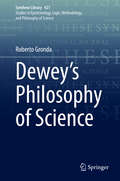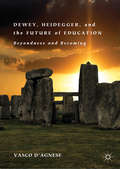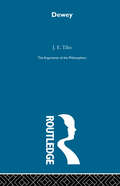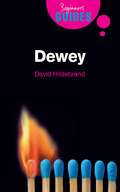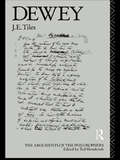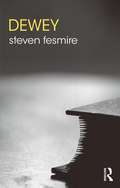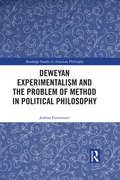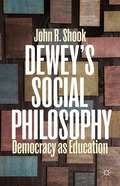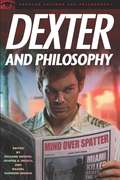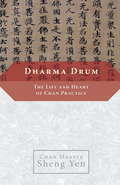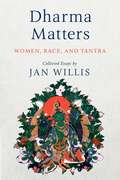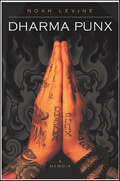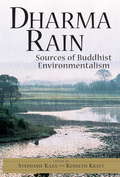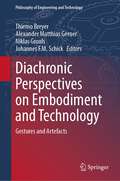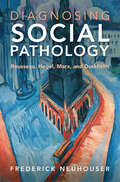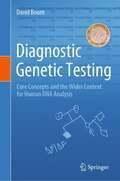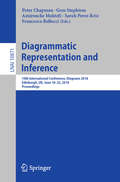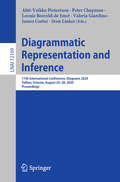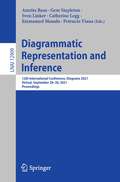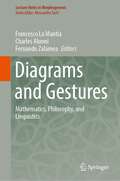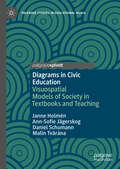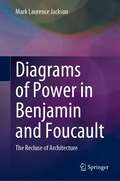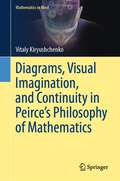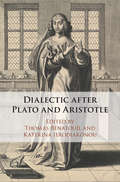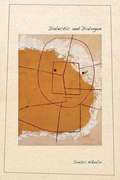- Table View
- List View
Dewey's Philosophy of Science (Synthese Library #421)
by Roberto GrondaThis monograph presents a unitary account of Dewey’s philosophy of science and demonstrates the relevance for contemporary debates. The book is written from a theoretical angle and explains Dewey's via on Experience, Language, Inquiry, Construction and Realism. Via taking this route the book addresses key philosophical problems - such as the nature of language, the idea of experience, the notion of logical constructivism, the criticism of representationalism and the nature of scientific practices.John Dewey (1859-1952) is one of the most representative philosophers of the United States. He is well known for his work in education, psychology and social reform and one of the primary figures associated with the philosophy of pragmatism. His Philosophy of Science underwent a period of almost total unpopularity and neglect. In recent times, however, as a consequence of the strong pragmatist renaissance we are now witnessing, Dewey’s philosophy of science has attracted new attention. This book presents for the first time a comprehensive overview of Dewey's philosophy of science and will be of interest to scholars working in nineteenth and twentieth century philosophy of science and on the relationship between Pragmatism and Logical Empiricism.
Dewey, Heidegger, and the Future of Education: Beyondness and Becoming
by Vasco d'AgneseDrawing on insights into the philosophies of Dewey and Heidegger, this book moves forward the greater philosophical discourse surrounding education. It illuminates deep affinities between the corresponding traditions of Dewey and Heidegger, broadly labeled hermeneutics and pragmatism, and in doing so reveals the potential of the Dewey-Heidegger comparison for the future of education. To accomplish this task, Vasco d’Agnese explores the Deweyan and Heideggerian understanding of existence and experience. Both thinkers believed that humans are vulnerable from the very beginning, delivered to an uncanny and uncertain condition. On the other hand, such an uncanniness and dependency, rather than flowing in nihilistic defeat of educational purposes, puts radical responsibility on the side of the subject. It is, then, educationally promising. The book explains that for both Dewey and Heidegger, being a subject means being-with-others while transcending and advancing one’s boundaries, thus challenging the managerial framework of education that currently dominates educational institutions throughout the world.
Dewey-Arg Philosophers (Arguments Of The Philosophers Ser.)
by J.E. TilesFirst Published in 1999. Routledge is an imprint of Taylor & Francis, an informa company.
Dewey: A Beginner's Guide (Beginner's Guides)
by David HildebrandAn icon of philosophy and psychology during the first half of the 20th century, Dewey is known as the father of Functional Psychology and a pivotal figure of the Pragmatist movement as well as the progressive movement in education. This concise and critical look at Dewey's work examines his discourse of "right" and "wrong," as well as political notions such as freedom, rights, liberty, equality, and naturalism. The author of several essays about thought and logic, Dewey's legacy remains not only through the works he left us, but also through the institutions he founded, which include The New School for Social Research in New York City and the University of Chicago Laboratory Schools. Hildebrand's biography brilliantly interweaves the different strands of Dewey's thought, and examines the legacy he left behind. David L. Hildebrand is Assistant Professor of Philosophy at the University of Colorado at Denver and Health Sciences Center. He has also taught at Rice University, The University of Memphis, and the University of Houston.
Dewey: Dewey (Arguments Of The Philosophers Ser.)
by TilesFirst Published in 1990. Routledge is an imprint of Taylor & Francis, an informa company.
Dewey: Pragmatism In Ethics (The Routledge Philosophers)
by Steven FesmireJohn Dewey (1859 - 1952) was the dominant voice in American philosophy through the World Wars, the Great Depression, and the nascent years of the Cold War. With a professional career spanning three generations and a profile that no public intellectual has operated on in the U.S. since, Dewey's biographer Robert Westbrook accurately describes him as "the most important philosopher in modern American history." In this superb and engaging introduction, Steven Fesmire begins with a chapter on Dewey’s life and works, before discussing and assessing Dewey's key ideas across the major disciplines in philosophy; including metaphysics, epistemology, aesthetics, ethics, educational philosophy, social-political philosophy, and religious philosophy. This is an invaluable introduction and guide to this deeply influential philosopher and his legacy, and essential reading for anyone coming to Dewey's work for the first time.
Deweyan Experimentalism and the Problem of Method in Political Philosophy (Routledge Studies in American Philosophy)
by Joshua ForstenzerThis book proposes a pragmatist methodological framework for generating practically relevant political philosophy. It draws on John Dewey’s social and political philosophy to develop an "experimentalist" method, thus charting a middle course between idealism and realism in political philosophy. Deweyan experimentalism promises to balance civic deliberation, empirical facts, and moral considerations by reconstructing Dewey’s pragmatist conceptions of ‘philosophy’ and ‘democracy’ from the perspective of social action. While some authors have taken the steps to articulate Dewey’s experimentalism, they have focused on institutional rather than methodological implications. This book is original in the ways in which it situates the role of ideas in political practice and contemporary political problems. Additionally, it underlines the similarities between today and the historical context in which Dewey wrote, connects Dewey’s social and political philosophy to Greek and Roman mythology, and concludes with a timely case study in which the author’s methodological insights are applied. The result is a book that offers a focused reconstruction of Dewey’s work and shows its relevance for engaging with contemporary issues in political philosophy and political theory.
Dewey�s Social Philosophy
by John R. ShookDewey advanced a political vision for democracy as a form of deliberative polyarchy grounded in community ethics. This vision depicts citizens engaged in communal exercises in experimental civic education. This ethical project, to successfully pervade all of democratic society must be revolutionarily comprehensive. Maintaining the civil peace, a productive economy, a participatory citizenry, an effective penal system, and a religiously harmonious society are top democratic priorities. The economy needs employees and entrepreneurs who are more broadly educated, not merely well-trained; education is so crucial for empowerment that it must be a civic guarantee; education should be prioritized in law and criminal justice; and education is crucial for ethical communities embracing religious pluralism. Dewey's core views on humanity's capacities for learning, socializing, problem-solving, self-ruling, and flourishing forge a whole far greater than its parts. His progressive revolution is yet to be realized, but his philosophy remains just as insightful and relevant as ever.
Dexter and Philosophy
by Richard Greene Rachel Robison George A. ReischWhat explains the huge popular following for Dexter, currently the most-watched show on cable, which sympathetically depicts a serial killer driven by a cruel compulsion to brutally slay one victim after another? Although Dexter Morgan kills only killers, he is not a vigilante animated by a sense of justice but a charming psychopath animated by a lust to kill, ritualistically and bloodily. However his gory appetite is controlled by "Harry's Code," which limits his victims to those who have gotten away with murder, and his job as a blood spatter expert for the Miami police department gives him the inside track on just who those legitimate targets may be. In Dexter and Philosophy, an elite team of philosophers don their rubber gloves and put Dexter's deeds under the microscope. Since Dexter is driven to ritual murder by his "Dark Passenger," can he be blamed for killing, especially as he only murders other murderers? Does Dexter fit the profile of the familiar fictional type of the superhero? What part does luck play in making Dexter who he is? How and why are horror and disgust turned into aesthetic pleasure for the TV viewer? How essential is Dexter's emotional coldness to his lust for slicing people up? Are Dexter's lies and deceptions any worse than the lies and deceptions of the non-criminals around him? Why does Dexter long to be a normal human being and why can't he accomplish this apparently simple goal?
Dharma Drum: The Life and Heart of Chan Pracice
by Master Sheng YenHere is an ideal guide to the practice of Chan Buddhism by a great modern teacher. Part One presents Master Sheng Yen's lively, anecdotal account of the history and main principles of the Chan tradition, along with his careful instructions for meditation. Part Two consists of 180 of his gemlike aphorisms and sayings that serve as inspirations to spiritual practice. The book will appeal to beginners as well as experienced students.
Dharma Matters: Women, Race, and Tantra
by Jan WillisA powerful collection of essays on race and gender in contemporary Buddhist practice, a hot-button topic in the West right now, by one of the leading thinkers in the area.Jan Willis was among the first Westerners to encounter exiled Tibetan teachers abroad in the late sixties, instantly finding her spiritual and academic home. TIME Magazine named her one of six &“spiritual innovators for the new millennium,&” both for her considerable academic accomplishments and for her cultural relevance. Her writing engages head-on with issues current to Buddhist practitioners in America, including dual-faith practitioners and those from marginalized groups. This collection of eighteen scholarly and popular essays spans a lifetime of reflection and teaching by Willis. Grouped in four sections—Women and Buddhism, Buddhism and Race, Tantric Buddhism and Saints&’ Lives, and Buddhist-Christian Reflections—the essays provide timeless wisdom for all who are interested in contemporary Buddhism and its interface with ancient tradition. &“This collection of essays by Jan Willis, penned over thirty years of study, teaching, and practice, is destined to become an authoritative resource in Buddhist scholarship and thought. Willis challenges many of our preconceptions, but asks no more and no less than what the Buddha asked: come, see, and experience for yourselves.&” —Sharon Salzberg, author of Lovingkindness and Real Happiness &“From Birmingham to Bodhgaya, Jan bridges worlds like no other. Her essays are treasures of wisdom born from a remarkable life richly lived.&” —Matthew T. Kapstein, author of Reason&’s Traces: Identity and Interpretation in Indian and Tibetan Buddhist Thought &“This book is a blessing for us all—across cultures, across genders, across traditions.&” —Larry Yang, author of Awakening Together: The Spiritual Practice of Inclusivity and Community
Dharma Punx: A Memoir
by Noah LevineFueled by the music of revolution, anger, fear, and despair, we dyed our hair or shaved our heads ... Eating acid like it was candy and chasing speed with cheap vodka, smoking truckloads of weed, all in a vain attempt to get numb and stay numb.This is the story of a young man and a generation of angry youths who rebelled against their parents and the unfulfilled promise of the sixties. As with many self-destructive kids, Noah Levine's search for meaning led him first to punk rock, drugs, drinking, and dissatisfaction. But the search didn't end there. Having clearly seen the uselessness of drugs and violence, Noah looked for positive ways to channel his rebellion against what he saw as the lies of society. Fueled by his anger at so much injustice and suffering, Levine now uses that energy and the practice of Buddhism to awaken his natural wisdom and compassion.While Levine comes to embrace the same spiritual tradition as his father, bestselling author Stephen Levine, he finds his most authentic expression in connecting the seemingly opposed worlds of punk and Buddhism. As Noah Levine delved deeper into Buddhism, he chose not to reject the punk scene, instead integrating the two worlds as a catalyst for transformation. Ultimately, this is an inspiring story about maturing, and how a hostile and lost generation is finally finding its footing. This provocative report takes us deep inside the punk scene and moves from anger, rebellion, and self-destruction, to health, service to others, and genuine spiritual growth.
Dharma Rain
by Stephanie Kaza Kenneth KraftA comprehensive collection of classic texts, contemporary interpretations, guidelines for activists, issue-specific information, and materials for environmentally-oriented religious practice. Sources and contributors include Basho, the Dalai Lama, Thich Nhat Hanh, Gary Snyder, Chögyam Trungpa, Gretel Ehrlich, Peter Mathiessen, Helen Tworkov (editor of Tricycle), and Philip Glass.
Diachronic Perspectives on Embodiment and Technology: Gestures and Artefacts (Philosophy of Engineering and Technology #46)
by Thiemo Breyer Johannes F. M. Schick Alexander Matthias Gerner Niklas GroulsThis book investigates the relationships between gestures and artefacts theoretically and historically, by analyzing different phenomena stemming from a variety of fields such as robotics, archaeology, gesture studies, anthropology, philosophy, and gestural practices like choreography, music performance, and composition. It underlines how embodiment and technology change the interplay between maker and artefact over time and appeals to students and researchers in these fields. Its goal is to enable the reader to understand that the recurring topics and questions as well as multi-level similarities are by no means accidental, but can best be understood if one pays attention to the intertwinements of materiality and cognition, praxis and techne.
Diagnosing Social Pathology: Rousseau, Hegel, Marx, and Durkheim
by Frederick NeuhouserCan a human society suffer from illness like a living thing? And if so, how does such a malaise manifest itself? In this thought-provoking book, Fred Neuhouser explains and defends the idea of social pathology, demonstrating what it means to describe societies as 'ill', or 'sick', and why we are so often drawn to conceiving of social problems as ailments or maladies. He shows how Rousseau, Hegel, Marx, and Durkheim – four key philosophers who are seldom taken to constitute a 'tradition' – deploy the idea of social pathology in comparable ways, and then explores the connections between societal illnesses and the phenomena those thinkers made famous: alienation, anomie, ideology, and social dysfunction. His book is a rich and compelling illumination of both the idea of social disease and the importance it has had, and continues to have, for philosophical views of society.
Diagnostic Genetic Testing: Core Concepts and the Wider Context for Human DNA Analysis
by David BournOver the last decade, technical advances have allowed genomic testing which provides a great opportunity for diagnosis but also an increased chance of uncertain or unexpected findings. This book addresses many of the questions that arise in this context and summarizes the essential concepts in diagnostic genetic testing in an easy-to-read manner. It also covers some broad context for the practical and ethical implications of examining human DNA sequences. The book starts with a general introduction to the field, providing enough background to allow readers without any previous education in genetics to comprehend the material in the subsequent chapters. The main part explores differing aspects of human genetics and the wider implications of testing in these areas. The author covers not only single gene inheritance, but also genetic testing of cancers and how testing benefits the patients. Special emphasis is also given to the questions of genetics and identity. The concluding part then draws the main themes together and summarises the wider significance of genetics. It also explores the gap between promises made for the impact of advances in genetics, and the actual benefits to patients. The book is written for everyone interested to learn about the process of genetic testing and the broader implications. Moreover, it is aimed at health professionals with an interest in genetics, at students or scientific trainees looking for an introduction to diagnostic genetics, and at professionals in health policy or health journalism.
Diagrammatic Representation and Inference: 10th International Conference, Diagrams 2018, Edinburgh, UK, June 18-22, 2018, Proceedings (Lecture Notes in Computer Science #10871)
by Peter Chapman Amirouche Moktefi Gem Stapleton Sarah Perez-Kriz Francesco BellucciThis book constitutes the refereed proceedings of the 10th International Conference on the Theory and Application of Diagrams, Diagrams 2018, held in Edinburgh, UK, in June 2018.The 26 revised full papers and 28 short papers presented together with 32 posters were carefully reviewed and selected from 124 submissions. The papers are organized in the following topical sections: generating and drawing Euler diagrams; diagrams in mathematics; diagram design, principles and classification; reasoning with diagrams; Euler and Venn diagrams; empirical studies and cognition; Peirce and existential graphs; and logic and diagrams.
Diagrammatic Representation and Inference: 11th International Conference, Diagrams 2020, Tallinn, Estonia, August 24–28, 2020, Proceedings (Lecture Notes in Computer Science #12169)
by Peter Chapman Ahti-Veikko Pietarinen Leonie Bosveld-de Smet Valeria Giardino James Corter Sven LinkerThis book constitutes the refereed proceedings of the 11th International Conference on the Theory and Application of Diagrams, Diagrams 2020, held in Tallinn, Estonia, in August 2020.*The 20 full papers and 16 short papers presented together with 18 posters were carefully reviewed and selected from 82 submissions. The papers are organized in the following topical sections: diagrams in mathematics; diagram design, principles, and classification; reasoning with diagrams; Euler and Venn diagrams; empirical studies and cognition; logic and diagrams; and posters. *The conference was held virtually due to the COVID-19 pandemic. The chapters ‘Modality and Uncertainty in Data Visualization: A Corpus Approach to the Use of Connecting Lines,’ ‘On Effects of Changing Multi-Attribute Table Design on Decision Making: An Eye Tracking Study,’ ‘Truth Graph: A Novel Method for Minimizing Boolean Algebra Expressions by Using Graphs,’ ‘The DNA Framework of Visualization’ and ‘Visualizing Curricula’ are available open access under a Creative Commons Attribution 4.0 International License via link.springer.com.
Diagrammatic Representation and Inference: 12th International Conference, Diagrams 2021, Virtual, September 28–30, 2021, Proceedings (Lecture Notes in Computer Science #12909)
by Amrita Basu Gem Stapleton Emmanuel Manalo Sven Linker Catherine Legg Petrucio VianaThis book constitutes the refereed proceedings of the 12th International Conference on the Theory and Application of Diagrams, Diagrams 2021, held virtually in September 2021. The 16 full papers and 25 short papers presented together with 16 posters were carefully reviewed and selected from 94 submissions. The papers are organized in the following topical sections: design of concrete diagrams; theory of diagrams; diagrams and mathematics; diagrams and logic; new representation systems; analysis of diagrams; diagrams and computation; cognitive analysis; diagrams as structural tools; formal diagrams; and understanding thought processes. 10 chapters are available open access under a Creative Commons Attribution 4.0 International License via link.springer.com.
Diagrams and Gestures: Mathematics, Philosophy, and Linguistics (Lecture Notes in Morphogenesis)
by Fernando Zalamea Francesco La Mantia Charles AlunniDrawing a line, and then another, and another. Go back from the lines to the movements they capture and see gestures in them: not spatial displacements, but modes of knowledge that pass through the exercise of the body. Discovering something new in a gesture: the line that contracts into a point or the point that expands into a zone, perhaps sinking into a hole. Thus experiencing a diagram: a becoming other inscribed in the novelty of the gesture and in the changes of the forms it shapes. This and much more is discussed in the essays gathered in Diagrams and Gestures. Resulting from trans-disciplinary work between mathematicians, philosophers, linguists and semioticians, the volume delivers an up-to-date account of the most valuable research on the connections between gesture and diagram. As one of the most important themes in contemporary thought, the study of these connections poses a challenge for the future: to elaborate a theory that is equal to new and stimulating research methodologies. We call this theory a philosophy of diagrammatic gestures.
Diagrams in Civic Education: Visuospatial Models of Society in Textbooks and Teaching (Palgrave Studies in Educational Media)
by Janne Holmén Daniel Schumann Ann-Sofie Jägerskog Malin TvärånaThis book presents the findings of three studies on the use of diagrams in civic education. The first study presents an international comparison of textbook diagrams promoting national unity in diversity, with examples from ten countries. The second focuses on the depiction of migration in diagrammatic form in German textbooks, The final study was conducted in collaboration with teachers in Swedish social science classrooms, and focuses on teaching comprehension of flow charts and scatterplots. The book will be of interest to scholars of educational media, didactics, the history of education and citizenship education.
Diagrams of Power in Benjamin and Foucault: The Recluse of Architecture
by Mark Laurence JacksonThis book’s overarching premise is that discussion and critique in the discourses of architecture and urbanism have their primary focus on engagements with form, particularly in the sense of the question as to what planning and architecture signify with respect to the forms they take, and how their meanings or content (what is “contained”) is considered in relation to form-as-container. While significant critical work in these disciplines has been published over the past 20 years that engages pertinently with the writings of Walter Benjamin and Michel Foucault, there has been no address to the co-incidence in the work of Benjamin and Foucault of an architectural figure that is pivotal to each of their discussions of the emergence of modernity: The arcade for Benjamin and the panoptic prison for Foucault have a parallel role. In Foucault’s terms, panopticism is a “diagram of power.” The parallel, for Benjamin, would be his understanding of “constellation.” In more recent architectural writings, the notion of the diagram has emerged as a key motif. Yet, and in as much as it supposedly relates to aspects of the work of Foucault, along with Gilles Deleuze, this notion of “diagram” amounts, for the most part, to a thinly veiled reinstatement of geometry-as-idea. This book redresses the emphasis given to form within the cultural philosophy of modernity and—particularly with respect to architecture and urbanism—inflects on the agency of force that opens a reading of their productive capacities as technologies of power. It is relevant to students and scholars in poststructuralist critical theory, architecture, and urban studies.“This is a book about Foucault and Benjamin and it is grounded in a deep knowledge of and reflection upon their works, but it is also underpinned by an impressive erudition. There are reflections on Hegel and Heidegger (central to the author) and Derrida, along with Kierkegaard, and others. This leads to a rich and suggestive discussion … in staging a spatial-architectural-political conversation between Foucault and Benjamin.”- Anonymous Reviewer“Mark Jackson’s Diagrams of Power in Benjamin and Foucault, The Recluse of Architecture juxtaposes and interrogates its two leading actors so as to draw from and through them a theory of architecture, which is inseparable from its recluse. In doing so it elaborates a series of complex connections with their various interlocutors and inspirations, Hegel, Heidegger, Derrida, the Kabbalah, Agamben, allegory, Marx, Deleuze, Klossowski, tragedy, capitalism, modernity, and so on. The list is long and impressive. This is not only done with an extremely high degree of scholarship, but is presented in a light, lucid and very compelling manner in a voice both personal and authoritative. The recluse is the figure of mimesis itself, the appearance of a withdrawal, always already a ruin. This book not only contributes a highly astute reading of its philosophical objects, but it enacts the ontology of the recluse through its own unfolding, simultaneously revealing and withholding the meaning of architecture ‘as such’, so that we not only understand its meaning, but feel the pulsing differential of the book’s object as if it were alive within us.”- Stephen Zepke, Independent Researcher, Vienna
Diagrams, Visual Imagination, and Continuity in Peirce's Philosophy of Mathematics (Mathematics in Mind)
by Vitaly KiryushchenkoThis book is about the relationship between necessary reasoning and visual experience in Charles S. Peirce’s mathematical philosophy. It presents mathematics as a science that presupposes a special imaginative connection between our responsiveness to reasons and our most fundamental perceptual intuitions about space and time. Central to this view on the nature of mathematics is Peirce’s idea of diagrammatic reasoning. In practicing this kind of reasoning, one treats diagrams not simply as external auxiliary tools, but rather as immediate visualizations of the very process of the reasoning itself. Thus conceived, one's capacity to diagram their thought reveals a set of characteristics common to ordinary language, visual perception, and necessary mathematical reasoning. The book offers an original synthetic approach that allows tracing the roots of Peirce’s conception of a diagram in certain patterns of interrelation between his semiotics, his pragmaticist philosophy, his logical and mathematical ideas, bits and pieces of his biography, his personal intellectual predispositions, and his scientific practice as an applied mathematician.
Dialectic after Plato and Aristotle
by Katerina Ierodiakonou Thomas BénatouïlAncient dialectic started as an art of refutation and evolved into a science akin to our logic, grammar and linguistics. Scholars of ancient philosophy have traditionally focused on Plato's and Aristotle's dialectic without paying much attention to the diverse conceptions and uses of dialectic presented by philosophers after the classical period. To bridge this gap, this volume aims at a comprehensive understanding of the competing Hellenistic and Imperial definitions of dialectic and their connections with those of the classical period. It starts from the Megaric school of the fourth century BCE and the early Peripatetics, via Epicurus, the Stoics, the Academic sceptics and Cicero, to Sextus Empiricus and Galen in the second century CE. The philosophical foundations and various uses of dialectic are closely analysed and systematically examined together with the numerous objections that were raised against them.
Dialectic and Dialogue
by Dmitri NikulinThis book considers the emergence of dialectic out of the spirit of dialogue and traces the relation between the two. It moves from Plato, for whom dialectic is necessary to destroy incorrect theses and attain thinkable being, to Cusanus, to modern philosophers-Descartes, Kant, Hegel, Schleiermacher and Gadamer, for whom dialectic becomes the driving force behind the constitution of a rational philosophical system. Conceived as a logical enterprise, dialectic strives to liberate itself from dialogue, which it views as merely accidental and even disruptive of thought, in order to become a systematic or scientific method. The Cartesian autonomous and universal yet utterly monological and lonely subject requires dialectic alone to reason correctly, yet dialogue, despite its unfinalizable and interruptive nature, is what constitutes the human condition.
